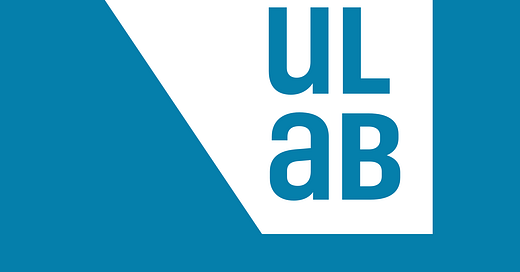During my time as ULAB’s archivist, I helped provide the history we were missing: a complete archive of all things ULAB, from our founding in 2011 to today.
There wasn’t an archive or any records of materials before 2019; we’d moved websites, changed emails, and as we cycled into new committees, past ULAB documents were lost. Some conferences had so little digital footprint I was half convinced they never existed.
But with help from Richard Littauer, one of ULAB’s founders, and presenters from early conferences, I (excitingly!) was able to recover almost every piece of the ULAB story. I transferred all content to our Drive, where I structured our archive and preserved our history.
You might be thinking, alright, great, why are decade-old materials important? Why do you even need an archive?
First: let me reframe it. When I say archive, you’re likely thinking of a windowless, temperature-controlled basement office, files upon files of information stacked everywhere. Very X-Files, very sterile.
Archives don’t just contain mundane receipts and email transcripts. They’re more than that; they’re repositories of who we are, and how we got to where we are. Ours, like many others, are filled with photographs (flip phone grain galore), meeting minutes, old logos, conference planning, various brainstorming, events that never made it past the drawing board.
It was an honor to read ULAB documents from prior years, and especially fascinating to speak with Richard Littauer and David Arnold, another ULAB founder, on our origins, as it were.
I met Richard in person at the 2022 conference in Edinburgh, who said he had no idea ULAB would still be up and running, and certainly not at the caliber it is today. Prior, we’d been in contact via email, and he was able to provide me with reams of content on a Dropbox he’d kept all these years (thank you).
David also let me in on some ULAB secrets: “ULAB” was actually a working title, but the original committee ended up keeping it. What were the other options? Unfortunately, we’re not sure, but we’re just glad ULAB stuck.
I’ve picked a few of my favorite archive materials from over the years to share in this blog post, but there’s much more where they came from! If you’d like to scour the archive yourself, keep an eye on the ULAB website – we'll be uploading everything we’ve got right here.
Somehow, the ULAB logo is both the starkest contrast to and the most similar branding between 2011 ULAB and 2022 ULAB.
The oldest ULAB logo in the archive is dated early 2011, featuring an all-lowercase aesthetic and often a waveform. ULAB blue (our dear, dear #057FAB) is a constant, as is the vowel trapezium, but ULAB is stylized as uLAB.
ULAB’s old logo, above.
We also changed the stylization to ULAB, all-caps, though the “U” and “A” of the logo still appear lowercase.
Our new logo, below.
It’s such fun to see the evolution of our graphic design but reflecting on past changes also begs the question of what’s to come. We’re able to cement our current place in the ULAB timeline by way of our branding and output, but in five years, what will our logo look like? Will ULAB blue be … (gasp) replaced? Perhaps future ULAB archivists will be writing similar pieces, in disbelief that 2022 ULAB didn’t have animated designs or host linguistics slam poetry nights.
Also within the 2011 Dropbox was a pie chart of universities represented at the first conference (below).
I made an updated one to compare (below):
Cambridge and Edinburgh are still top contenders (consistency!) but we’re proud to have so many diverse institutions represented, and we hope to continue adding more to the tally. How many different countries can you spot?
Hidden gems of the archive are often found in the marginalia of digital documentation; meeting minutes shorthand or comments on unfinished files. A favorite of mine is from Edinburgh 2014, rife with placeholders as the committee planned the conference.
Fortunately, [whatever it is] is now @ULAB_Ling (on Twitter and Instagram) and you can find us on Facebook here. Our current email is ulablinguistics@gmail.com - please don’t email ulab2014edinburgh! We can’t get into it! Your email will be relegated to the dark dungeon of Gmails-past forever!
I hope that sharing a few files from the vault has sparked a broader interest in ULAB’s history and inspired a drive to continue growing our archive. Who knows what else is out there? We may still be missing pieces of the puzzle, and it may be up to you to find them.








